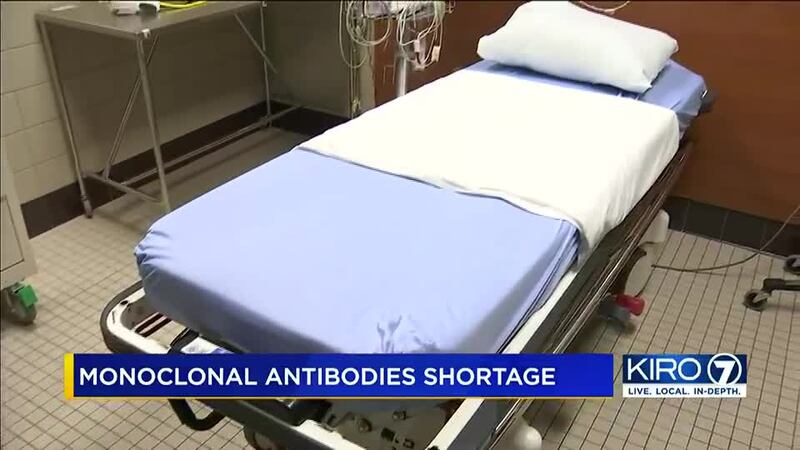SNOQUALMIE, Wash. — Monoclonal antibodies, the lifesaving treatment used to fight COVID-19, have skyrocketed in demand.
With supplies so low, there are concerns that people who really need the treatment won’t be able to get it.
The nationwide shortage is being felt in Washington state hospitals.
The therapeutics are lab-engineered. When infused or injected into the body, the antibodies trigger a healthy immune response against a COVID-19 infection.
Snoqualmie Valley Hospital CEO, Renee Jensen, said there’s not enough to go around, especially in communities with lower vaccination rates.
“We do our best here in east King County and serve the more rural population,” said Jensen. “We’re hoping to get a few more to help people who really need it.”
Jensen says they really do make a difference but you can’t just walk into an emergency room and get a dose. There are criteria.
Scroll down to continue reading
More news from KIRO 7
- Buddhist nun, monk attacked at temple
- Family pushes for ‘cold water shock’ warning signs
- Government shutdown: What happens to Social Security, SNAP, VA benefits and more?
- Do you have an investigative story tip? Send us an email at investigate@kiro7.com
Recipients must be of a certain age, have underlying conditions or are at risk of a long hospital stay.
“I think the biggest thing that people want to know is if (they have) been exposed to somebody that’s had COVID, but (have) tested negative or have symptoms, is ‘should I get some antibody anyway?’ And the answer is no,” said Jensen.
Another problem is misconceptions among the unvaccinated.
“I think in some situations people are seeing this as a substitute to the vaccines, which it obviously is not,” Washington State Department of Health COVID-19 advisor Dr. Bob Lutz said.
Lutz works with regional medical centers and local health leaders.
“Certainly, many people have chosen for whatever reason not to get vaccinated and therefore they’re seeing this as a means which if they get COVID, they can certainly get treated for it,” said Lutz.
Lutz says this is an issue because the treatments take two to three hours. During that time, there’s an impact on space and staff.
“If hospitals, burdened as they are, are also seeing individuals coming in for monoclonals, it’s going to put even more stress on the system,” said Lutz.
Hospital workers, who are already spread thin, are at a greater risk of contracting COVID-19.
“People are lucky to get the antibody, but it’s not a miracle cure by any means,” said Jensen.
Doctors said if you have COVID-19 and qualify for the antibodies, the sooner you get the treatment, the better, as the antibodies have less of an impact once someone becomes extremely ill.
©2021 Cox Media Group








